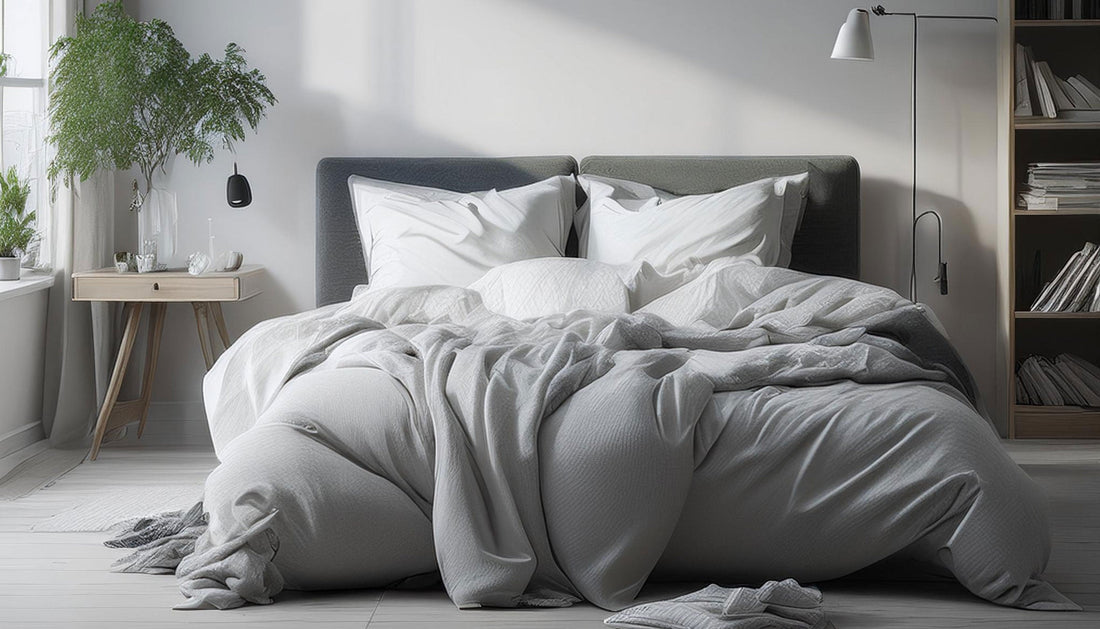
Purchasing new bedding is a significant investment, and one that plays a major role in your overall comfort and quality of sleep. Here at Laud Sleep, we get it.
After all, bedding is more than just aesthetics - it’s a key ingredient for creating a restful, inviting, and comfortable space where you can truly relax and unwind.
However, with so many materials, styles, and options on the market, it’s easy to make mistakes, and selecting the right bedding can feel overwhelming, especially with so many buzzwords and conflicting advice out there on the internet.
Should you focus on thread count? What materials are best for different seasons? Do you really need that mattress protector or a new set of pillows?
These are all common questions, and the answers can make such a difference when it comes to the quality of your sleep.
So here's 5 common bedding mistakes you can make, and how to avoid them...
1. Only looking at high thread count bedding
When browsing for new duvets and other bedding options, many buyers will only focus on thread count, assuming that high thread count bedding will be automatically better. But this isn't necessarily correct, as the material itself has a more significant impact on the quality of a bedding set - thread count aside.
Instead of looking just at the thread count, look for options that are made from high-quality cotton, such as Egyptian cotton bedding, percale, or Supima.
For those looking for breathability and moisture-wicking, bamboo bedding is an excellent option, especially for naturally hot sleepers. Or alternatively, linen bedding is also a great choice, as this has hollow fibres which are naturally insulating - keeping you warm in the winter, and cool in the summer.
2. Not investing in a good mattress protector
A mattress topper is an often overlooked part of your bedding set-up, but it’s an essential addition that you shouldn't miss. Not only does it shield your mattress from spills, sweat, and allergens, but it can also extend the lifespan of your mattress significantly - without you doing anything at all!
Without a mattress topper, dirt and moisture can seep into the mattress, creating an ideal breeding ground for bacteria to bloom.
So when choosing a mattress protector for your bed, look for one that is breathable and waterproof to ensure both comfort and durability, such as bamboo mattress toppers. There are also hypoallergenic options which are a great choice for people with allergies, or sensitive skin.
3. Ignoring seasonal requirements
Bedding sometimes isn't a one size fits all purchase, and bedding options that work well in winter might not always work well in the summer.
In the warmer summer months, lightweight materials, such as percale cotton or bamboo, are great for keeping cool. Whereas in the winter, flannel sheets or a duvet with a higher tog rating can provide us with warmth and comfort.
But what is tog rating? This is a term used to describe the thermal resistance, or level of warmth of duvets. Typically, the higher the tog rating, the warmer the bedding. But looking solely at tog rating isn't always a good idea, as everyone has different requirements.
For year-round comfort, linen bedding is the perfect choice, as this has thermo-regulating properties, and is 30% stronger than cotton.
It’s important to not ignore seasonal requirements for your bedding, as this can lead to restless nights and discomfort, so it’s always a good idea to switch out your bedding when the seasons change.
4. Washing and storing bedding incorrectly
Like many things, your bedding requires proper care and a regular maintenance routine to keep its quality and longevity, but overwashing can degrade the fabric and shorten its lifespan, especially for more delicate materials such as silk.
Washing weekly, or even bi-weekly, is a good rule of thumb to balance hygiene and preservation for your bedding.
It’s also important to store your bedding away properly when it’s not in use, as bedding stored in damp or poorly ventilated spaces can develop odours or mould.
Store your bedding in breathable bags or dry containers to keep them contained and safe from the indoor elements, and add lavender sachets or silica packs to help keep them fresh and in top condition when they’re not in use.
5. Skipping the importance of pillow selection
Whilst much attention is often given to sheets and duvets, pillows are just as crucial for a good night's sleep. Many people either stick with old, flattened pillows, or choose pillows that don’t support their sleeping style.
Choosing the wrong pillow can cause neck pain, poor posture, and restless sleep, so instead, choose a pillow that aligns with your sleeping position. We recommend firmer pillows for side sleepers, medium-firm for back sleepers, and softer options for stomach sleepers.
Replacing your pillows every 1–2 years is also vital, as this ensures that they remain supportive and hygienic.
A good pillow choice includes bamboo pillows, as they promote better moisture retention, as well as a softer complexion - meaning no more frizzy hair, less wrinkles and less sleep lines. Bamboo pillows are also naturally anti-bacterial and anti-allergy, and you can get them in all different types - firm, soft, gel, and even in mini sizes.
On the other hand, using sleep fragrances such as pillow sprays to help relax your senses and aid sleep is another option for those who want an extra restful night.

